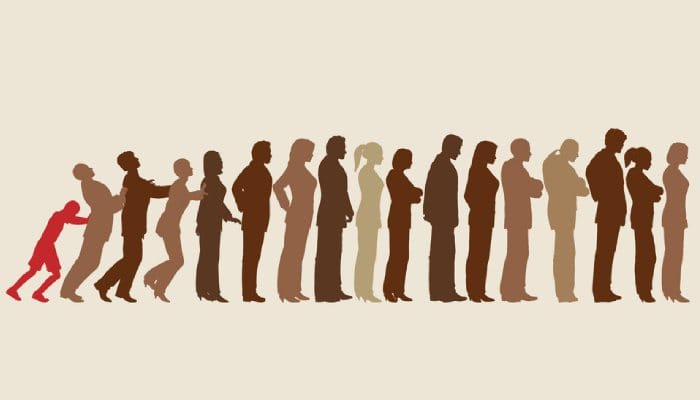
Blog
Patience and Tolerance

Patience is considered one of the essentials of human life. As a being constantly exposed to choices and unexpected events beyond control, humans need the factor of patience. When a person loses a loved one, ends a relationship, or faces an illness, they cannot overcome these stages without patience. On the other hand, not everything always goes according to our wishes, and we must learn that when everything is going well, we should not become arrogant, and when we are going through difficulties, we must remain patient. Therefore, this writing will explore the psychology of patience and examine the characteristics of patient and impatient individuals.
فهرست عناوین
ToggleHistory of Patience and Tolerance in Psychology
Since around 2005, psychologists have believed that humans should be able to control their emotions in response to various events. However, between 1996 and 2006 A wide-ranging ten-year study was conducted in America and France and led psychologists to the conclusion that When a person tries to control his emotions, it intensifiesFor example, the more you try to suppress your laughter, the more likely you are to laugh, especially in formal situations or during funeral ceremonies. The scientific reason for this phenomenon is that when you try to control your emotions, your blood glucose levels increase, and instead of focusing your energy on the specific action, it gets diverted to controlling your emotions. Since you cannot focus on two tasks simultaneously, you fail to control your emotions effectively.
Patience is not just the ability to wait, but how we behave while waiting. (Joyce Meyer)

Culture of Instant Gratification
Unfortunately, today we are witnessing the widespread acceptance of a culture of instant gratification and immediate rewards. Humans continually create advanced devices, instant service systems, and internet-based access to information, all of which minimize the time it takes for a person to experience satisfaction. This, in turn, has led to a decrease in patience among individuals. However, it is important that as humans, we develop the ability to delay gratification and resist the temptation of immediate rewards. To better understand this concept, we draw your attention to the famous marshmallow experiment conducted by Walter Mischel, a psychologist and professor at Stanford University, in the 1960s and 1970s. In this experiment, children were given a marshmallow and told they could either eat it immediately or wait a few minutes to receive a second marshmallow as a reward. The children who were able to wait became more patient individuals in the future, having strengthened their ability to delay gratification, while those who chose the immediate reward showed deficiencies in patience. In fact, patient individuals possess certain characteristics, some of which we will now explore.
Characteristics of Patient Individuals
- Patient individuals are able to endure life’s adversities with perseverance and can make a significant impact on history. Great figures such as the Dalai Lama, Martin Luther King, Sigmund Freud, and others exemplified patience, and through it, they achieved profound inner understanding.
Imagine a scale, where on one side lie all the things you don’t want, such as “I don’t want to get sick,” “I don’t want to argue with my spouse,” “I don’t want to be broke,” and so on. When this side weighs down, the opposite side—representing anxiety and fears—rises. Therefore, in order to avoid anxiety and fear, you must let go of the “don’ts.” Otherwise, you will fall into a cycle of complaining, and complaining is directly linked to dissatisfaction with life. - One way to prevent anxiety is to accept events with open arms. Just like with laughter—if you don’t try to suppress it, you’ll laugh briefly, and then it will be over. However, if you constantly suppress it, it intensifies. Patient individuals do not avoid problems; they embrace them. The more you try to run from something, the more deeply you become entangled in it.
- Patient individuals have accepted the principle that no flower blooms without the thorn, and no success is achieved without effort.
- They define rules and boundaries for themselves, which may bring limitations. These limitations can either lead to deprivation or contribute to their elevation.
- Prominent figures like Nelson Mandela and Mahatma Gandhi focused all their attention on one goal and practiced patience and persistence towards it. On the other hand, individuals without clear, long-term goals struggle to be patient. In fact, the more precise, deep, broad, and valuable a person’s values are, the more patient they are. Examples of values that characterize a patient person include love and service to others.
- Patient individuals move forward with power and determination on the path they have defined for themselves, avoiding getting lost in social networks or trends. They are not swayed by the desires of others.
- A patient person understands that failure and loss are inseparable aspects of human life, so they do not become restless in the face of losing loved ones.
Suggested article: Schemas

Characteristics of Impatient Individuals
- They live without a specific goal and burden in any direction and their goals are limited to survival and daily life.
- They have a low value level, and the lower they define their values, the more they get involved in numerous and everyday problems.
- They are constantly complaining and unhappy about the current situation.
- When they fail and lose, they lose their control and engage in unreasonable behavior.
In conclusion, perseverance is an inseparable factor of patience. No hundred-year journey can be completed in a single night, and no success can be achieved in one day. To achieve success, one must be hardworking, remain consistent on their path, and continuously strive towards their goals.
برای مشاوره رایگان و رزرو وقت (یا اگر تماس گرفتید و قادر به پاسخگویی نبودیم) شماره تماس خود را وارد کنید. ما به زودی با شما تماس می گیریم!



